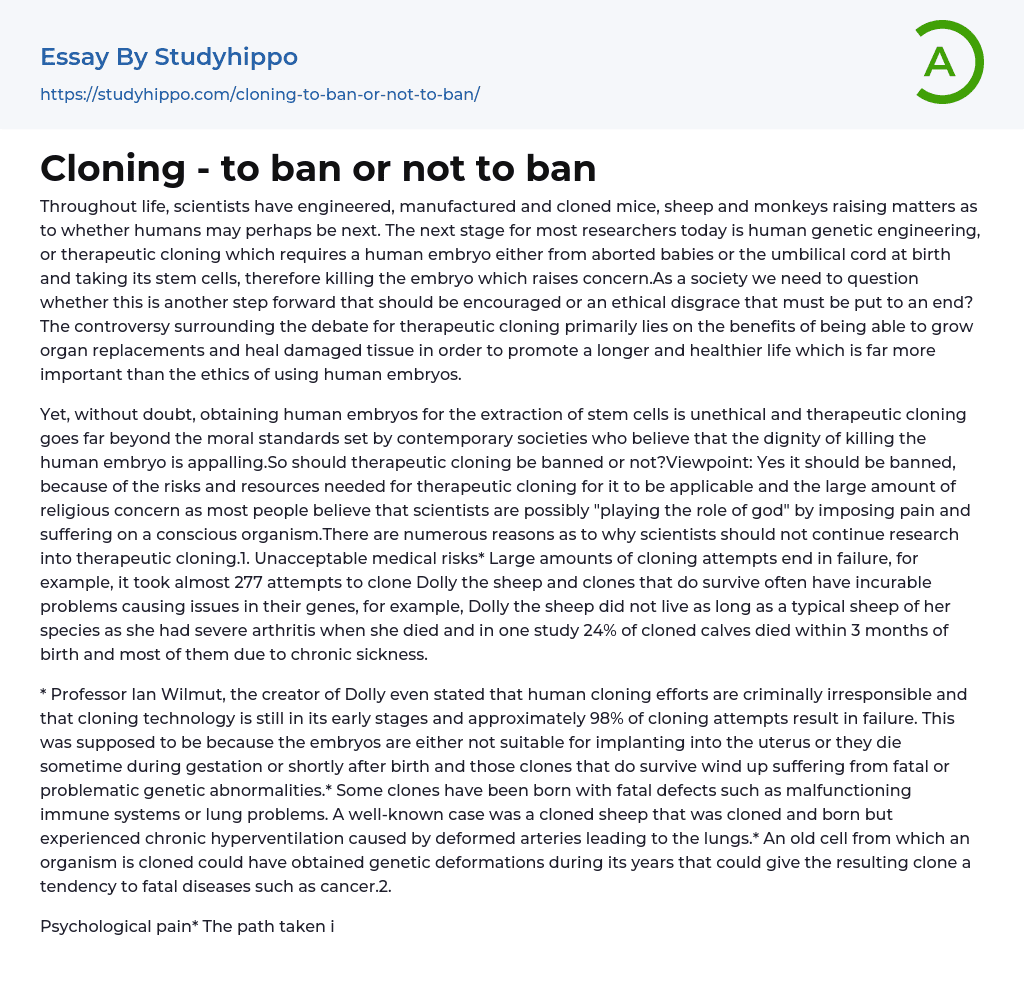Throughout their lifetime, scientists have created clones of mice, sheep, and monkeys, which raises the question of whether humans could be next. Currently, researchers are focusing on human genetic engineering and therapeutic cloning, which involves obtaining stem cells from a human embryo, often acquired from aborted fetuses or the umbilical cord at birth, leading to ethical concerns and debates. Society must deliberate whether this is a step in the right direction or an ethical disaster. The dispute surrounding therapeutic cloning revolves around the idea that it could promote a longer and healthier life by growing organ replacements and healing damaged tissues, making it more important than the use of human embryos' ethics.
Therapeutic cloning is a controversial topic that raises ethical concerns regarding the use of human embryos for stem cell extraction. Many contemporary societies find killing human embryos
...to be immoral, making therapeutic cloning far beyond moral standards. Thus, the question of whether it should be banned or not arises. The viewpoint in favor of banning therapeutic cloning cites various reasons, including the significant risks posed to human health and the necessary resources for its application. Additionally, there is extensive religious concern, as many people believe that scientists are "playing the role of god" and causing pain and suffering to conscious organisms. Multiple reasons support discontinuing research into therapeutic cloning, such as the unacceptable medical risks associated with cloning attempts. For instance, Dolly the sheep required 277 attempts to be cloned, and clones with otherwise high rates of survival frequently experience incurable problems due to altered genes. Cloned animals also face chronic sickness and a high mortality rate within three months of birth.
Professor Ia
Wilmut, who created Dolly the sheep, has strongly condemned human cloning as a criminally irresponsible action. He believes that current cloning technology is still in its early stages and that roughly 98% of cloning attempts fail due to unsuitability of embryos for implantation, gestational complications, or post-birth fatalities. Among successful clones, many suffer from grave genetic abnormalities such as malfunctioning immune systems or lung problems, while some cases have resulted in clones with deformed arteries causing chronic hyperventilation. Additionally, the use of old cells for cloning can result in fatal diseases like cancer due to genetic deformations accumulated over time.
Psychological distress may be experienced by the clone's twin due to the path they take in life. The clone may also have concerns regarding their own uniqueness and individuality. Additionally, they may face major inequality within society as an "artificial child". Criticism in relation to the original version may constantly plague the clone's life.
The reduction of biodiversity could cause confusion for friends unable to distinguish between clones and their originals, infringe on the freedom of choice for clones who do not consent to being cloned, convert reproduction into manufacturing, desensitize society to the value and dignity of human life, and diminish "human life" to "human cellular life".
Cloning could result in controlling children and changing the concept of parenting. It would mean that humans are produced artificially rather than born naturally. Additionally, the practice of cloning may lead to the pursuit of Eugenics, which prioritizes physical traits over a person's social or educational opportunities.
The use of embryos for medical treatment is a controversial topic due to ethical concerns. Many people reject the idea of sacrificing
one life to save another, despite potential benefits offered. Some argue that offering the embryo a chance at life is a better option. As a society, we should accept disease as a natural part of life and take responsibility for our choices since death from incurable illnesses is inevitable. Additionally, Director Peter Garrett opposes therapeutic cloning because he believes it goes against respect for all human life. He argues that intentionally taking innocent lives for others' benefit is exploitation and discrimination towards vulnerable individuals regardless of their size or importance.
Genetic alteration LIFE research article
Hannah M. Vick, an Embryonic Stem Cell Researcher, contends that the moral and ethical dilemmas associated with therapeutic cloning render it unsustainable. She asserts that endangering a human life cannot be rationalized by hypothetical medical gains. Conversely, proponents argue against its prohibition owing to its potential contribution towards medical advancement and treatment of diverse illnesses. For example, stem cells could be cultivated to mitigate dementia, Alzheimer's disease, strokes, generate replacement limbs and organs rapidly thereby reducing wait times for transplant recipients.
- Population essays
- Cultural Assimilation essays
- Demography essays
- Ethnographic essays
- Population Growth essays
- Pregnancy essays
- Death essays
- Asthma essays
- Chronic Pain essays
- Diabetes essays
- Infection essays
- Infertility essays
- Pain essays
- Sexually Transmitted Disease essays
- Cholesterol essays
- Epidemic essays
- Pathogen essays
- Symptom essays
- Water supply essays
- Myocardial Infarction essays
- Chronic essays
- Hypertension essays
- Black Death essays
- Breast Cancer essays
- Down Syndrome essays
- Apoptosis essays
- Tuskegee Syphilis Experiment essays
- Type 2 Diabetes essays
- Dna essays
- Gene essays
- Anthropology essays
- Audience essays
- Charity essays
- Cultural Competence essays
- Emile Durkheim essays
- Gender Roles essays
- Generation essays
- Globalization essays
- Interpersonal Relationship essays
- People essays
- Race essays
- Social Change essays
- Social Class essays
- Social Movement essays
- Social Science essays
- Social Status essays
- Social Stratification essays
- Society essays
- Sociological Imagination essays
- Sociological Perspective essays




